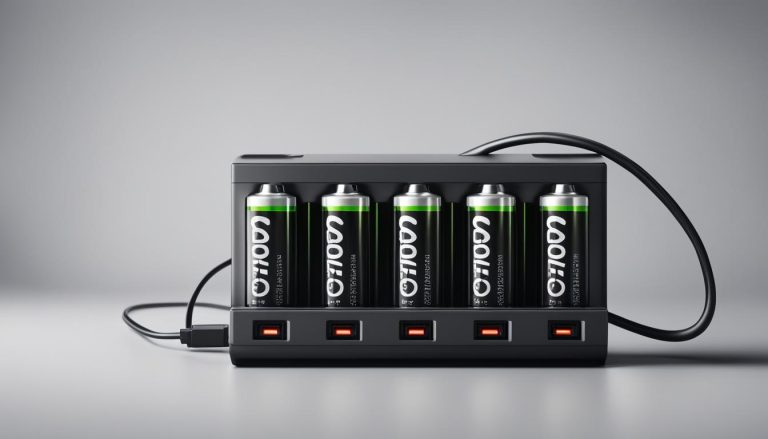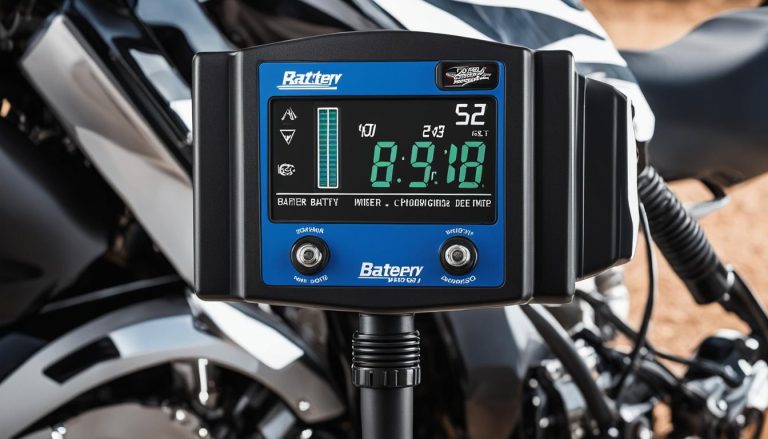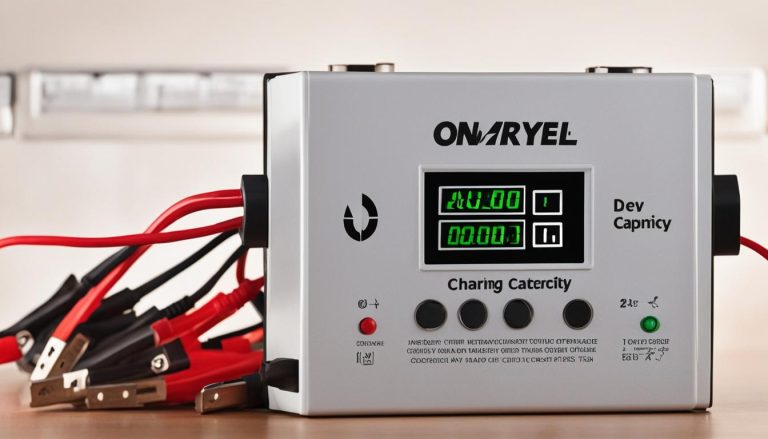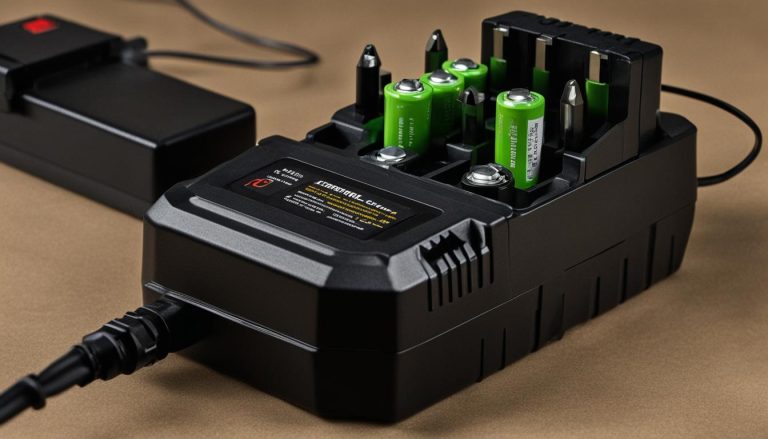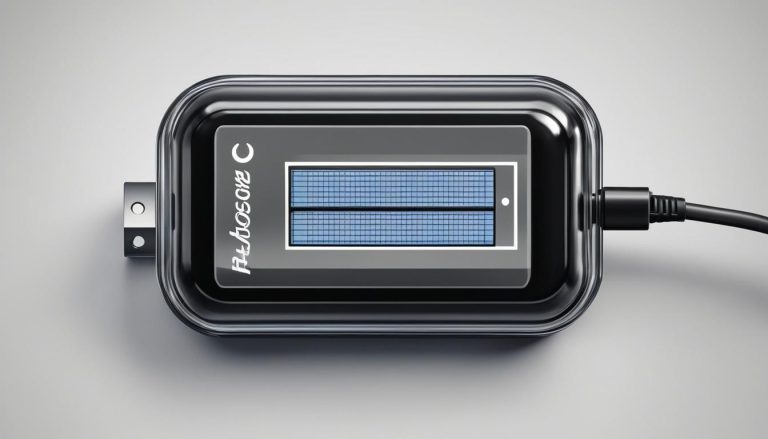Charging Time for 12V Battery: Find Out Now!
batterychargers.site and its partners may earn a commission if you purchase a product through one of our links
Are you wondering how long it takes to charge a 12V battery? Whether you need to charge your car battery or power your portable devices, understanding the charging time is essential for planning your activities. In this article, we will explore the factors that determine the duration to charge a 12V battery and how to calculate it accurately.
Key Takeaways:
- Understand the charging time for your 12V battery to optimize its usage.
- Use the battery charge time calculator or specific formulas for accurate calculations.
- Jackery Explorer Power Stations offer quick charging options for their battery backups.
- Calculate battery charging time based on battery capacity and charge current.
- Different battery types have varying charging efficiencies, affecting the charging time.
How to Calculate Battery Charging Time in Electrical Units
The battery charging time can be calculated by dividing the battery capacity (rated in amp hours) by the charge current (in amps). To determine the charging time accurately, it is essential to understand the relationship between battery capacity, charge current, and the appropriate conversion formulas.
Battery capacity represents the amount of energy a battery can store and is typically measured in amp hours (Ah). Charge current, on the other hand, refers to the rate at which electric current is supplied to the battery during the charging process.
By dividing the battery capacity (in Ah) by the charge current (in amps), you can calculate the charging time in hours. For example, if your battery has a capacity of 200Ah and the charging current is 20 amps, the charging time would be:
Charging Time = Battery Capacity / Charge Current
Charging Time = 200Ah / 20A = 10 hours
When working with battery capacity and charge current expressed in units such as milliamp hours (mAh), watt hours (Wh), or kilowatt hours (kWh), it is important to use the corresponding conversion formulas to ensure accurate calculations.
Here are the conversion formulas for commonly used units:
- 1 Ah = 1,000 mAh
- 1 Ah = 0.001 kWh
- 1 Ah = 0.001 * Battery Voltage * Wh
- 1 Wh = Battery Voltage * Ah
- 1 kWh = Battery Voltage * Ah
For example, if you have a battery capacity of 200,000 mAh and the charging current is 2 amps, you would first convert the battery capacity to amp hours using the formula:
Battery Capacity (Ah) = Battery Capacity (mAh) / 1,000
Battery Capacity (Ah) = 200,000 mAh / 1,000 = 200 Ah
Then, you can calculate the charging time using the same formula mentioned earlier:
Charging Time = Battery Capacity / Charge Current
Charging Time = 200 Ah / 2 A = 100 hours
By understanding the relationship between battery capacity, charge current, and using the appropriate conversion formulas, you can accurately calculate the charging time for your battery.
How to Calculate Battery Charging Time with Different Types
The battery charging efficiency plays an important role in determining the charging time. Different types of batteries, such as lithium-ion, lead acid, NiCd, and NiMH, have varying efficiencies and lifespans.
Lithium-ion batteries are known for their high energy density and longer lifespan, with an efficiency of 90-95%. On the other hand, lead acid batteries are less expensive but have a shorter lifespan and an efficiency of 80-85%. NiCd and NiMH batteries have lower efficiencies of 70-85% but are suitable for specific applications.
Understanding the charging efficiency and type of battery is crucial for accurate charging time calculations.
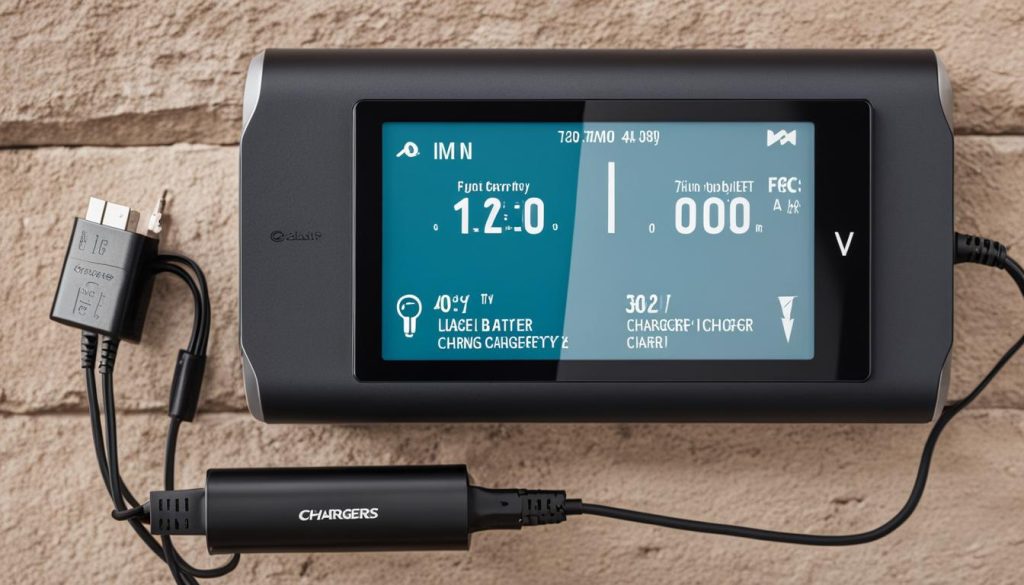
| Battery Type | Efficiency | Lifespan |
|---|---|---|
| Lithium-ion | 90-95% | Longer |
| Lead Acid | 80-85% | Shorter |
| NiCd | 70-85% | Varies |
| NiMH | 70-85% | Varies |
How to Calculate Battery Charging Time with Charging Current
When it comes to calculating the charging time for your battery, one important factor to consider is the charging current. The charging current depends on various factors such as the battery size, chemistry, and the charging method being used.
To determine the charging current, you can use the C rating of the battery. The C rating indicates the rate at which the battery can be charged or discharged. By knowing the C rating, you can accurately determine the time it takes to charge the battery.
It’s also crucial to take into account factors like battery discharge and depth of discharge (DoD) to ensure accurate calculations. Battery discharge refers to the amount of energy consumed by the battery during use, while DoD refers to the percentage of the battery’s capacity that has been used up. These factors directly impact the overall battery capacity and energy consumed during charging.
By considering the charging current, battery size, C rating, battery discharge, and DoD, you can calculate the optimal charging time for your battery. This allows for efficient utilization and proper maintenance of your battery, ensuring reliable power when you need it most.
FAQ
How long does it take to charge a 12V battery?
The charging time for a 12V battery depends on its capacity and the charging current. To calculate the charging time accurately, divide the battery capacity (in amp hours) by the charge current (in amps). For example, if the battery capacity is 200Ah and the charging current is 20 amps, the charging time would be 10 hours.
How do I calculate battery charging time in electrical units?
To calculate battery charging time in electrical units, you need to know the battery capacity (rated in amp hours) and the charge current (in amps). By dividing the battery capacity by the charge current, you can determine the charging time. Different units, such as milliamp hours (mAh), watt hours (Wh), or kilowatt hours (kWh), require specific formulas for the calculation. Conversion formulas can also be used to achieve accurate results if the units are mismatched.
How does the type of battery affect the charging time?
The type of battery, such as lithium-ion, lead acid, NiCd, or NiMH, can affect the charging time due to variations in efficiency and lifespan. Lithium-ion batteries have high energy density and longer lifespans, with an efficiency of 90-95%. Lead acid batteries are less expensive but have shorter lifespans and an efficiency of 80-85%. NiCd and NiMH batteries have lower efficiencies of 70-85% but are suitable for specific applications. Understanding the charging efficiency and battery type is crucial for accurate charging time calculations.
How can I calculate battery charging time using the charging current?
Battery charging time can be calculated based on the charging current, which depends on the battery size, chemistry, and charging method. The charging current can be determined using the C rating of the battery, which indicates the rate of time it takes to charge or discharge. It is also important to consider factors like battery discharge and depth of discharge (DoD), as they affect the overall battery capacity and energy consumption during charging. By taking these variables into account, you can calculate the optimal charging time based on the charging current and specific battery characteristics.

